 Backend Development
Backend Development
 PHP Tutorial
PHP Tutorial
 PHP7 kernel analysis 4 local variables, global variables, constants
PHP7 kernel analysis 4 local variables, global variables, constants
PHP7 kernel analysis 4 local variables, global variables, constants
The content of this article is about local variables, global variables, and constants in PHP7 Kernel Analysis 4. Now I share it with you. Friends in need can refer to it
1. Local variables
Local variables in PHP are allocated on the zend_execute_data structure. Each time zend_op_array is executed, a new zend_execute_data will be generated. Local variables are allocated at the beginning of execution and then released at the end of execution. This is the local variable life cycle.
Read and write operations: Local variables are read and written through the number determined at compile time
2. Static variables
The storage location of static variables: zend_op_array->static_variables, this is a hash table, so static variables in PHP are different from ordinary local variables. They are not allocated in the execution space zend_execute_data, but in the hash table. The form is saved in zend_op_array. Static variables will only be initialized once. Note: Its initialization occurs in the compilation phase rather than the execution phase. This feature also means that the initial value of a static variable cannot be a variable, for example: static $count = $xxx; Such a definition will result in an error
Read and write operations: First, retrieve the corresponding zval from static_variables based on the variable name, then modify it to a reference type and assign it to a local variable. That is to say, static $count = 4; contains two operations, strictly $count is not a real static variable, it is just a local variable pointing to a static variable. The actual operation when executing is: $count = & static_variables["count"];

3. Global variables
Global variables always exist during the entire request execution, and they are saved in EG( executor_globals , Zend executor-related global variables) in the symbol_table, like the storage of static variables, this is also a hash table. Before zend_execute_ex execution starts, all global variables in the current scope will be added to the EG's symbol_table.
Read and write operations: Like the access of static variables, global variables also convert the original value into a reference, and then create a local variable in the scope of the global import to point to the reference

4. Constants
Constants are stored in EG’s zend_constants hash table and are also accessed Search directly in the hash table according to the constant name
1 2 3 4 |
|
Related recommendations:
PHP7 Kernel Analysis 1 CGI and FastCGI
PHP7 I/O model of kernel analysis 2
Variables of PHP7 kernel analysis 3
The above is the detailed content of PHP7 kernel analysis 4 local variables, global variables, constants. For more information, please follow other related articles on the PHP Chinese website!

Hot AI Tools

Undresser.AI Undress
AI-powered app for creating realistic nude photos

AI Clothes Remover
Online AI tool for removing clothes from photos.

Undress AI Tool
Undress images for free

Clothoff.io
AI clothes remover

Video Face Swap
Swap faces in any video effortlessly with our completely free AI face swap tool!

Hot Article

Hot Tools

Notepad++7.3.1
Easy-to-use and free code editor

SublimeText3 Chinese version
Chinese version, very easy to use

Zend Studio 13.0.1
Powerful PHP integrated development environment

Dreamweaver CS6
Visual web development tools

SublimeText3 Mac version
God-level code editing software (SublimeText3)

Hot Topics
 1658
1658
 14
14
 1415
1415
 52
52
 1309
1309
 25
25
 1257
1257
 29
29
 1231
1231
 24
24
 Explain JSON Web Tokens (JWT) and their use case in PHP APIs.
Apr 05, 2025 am 12:04 AM
Explain JSON Web Tokens (JWT) and their use case in PHP APIs.
Apr 05, 2025 am 12:04 AM
JWT is an open standard based on JSON, used to securely transmit information between parties, mainly for identity authentication and information exchange. 1. JWT consists of three parts: Header, Payload and Signature. 2. The working principle of JWT includes three steps: generating JWT, verifying JWT and parsing Payload. 3. When using JWT for authentication in PHP, JWT can be generated and verified, and user role and permission information can be included in advanced usage. 4. Common errors include signature verification failure, token expiration, and payload oversized. Debugging skills include using debugging tools and logging. 5. Performance optimization and best practices include using appropriate signature algorithms, setting validity periods reasonably,
 Explain late static binding in PHP (static::).
Apr 03, 2025 am 12:04 AM
Explain late static binding in PHP (static::).
Apr 03, 2025 am 12:04 AM
Static binding (static::) implements late static binding (LSB) in PHP, allowing calling classes to be referenced in static contexts rather than defining classes. 1) The parsing process is performed at runtime, 2) Look up the call class in the inheritance relationship, 3) It may bring performance overhead.
 Why does an error occur when installing an extension using PECL in a Docker environment? How to solve it?
Apr 01, 2025 pm 03:06 PM
Why does an error occur when installing an extension using PECL in a Docker environment? How to solve it?
Apr 01, 2025 pm 03:06 PM
Causes and solutions for errors when using PECL to install extensions in Docker environment When using Docker environment, we often encounter some headaches...
 What are PHP magic methods (__construct, __destruct, __call, __get, __set, etc.) and provide use cases?
Apr 03, 2025 am 12:03 AM
What are PHP magic methods (__construct, __destruct, __call, __get, __set, etc.) and provide use cases?
Apr 03, 2025 am 12:03 AM
What are the magic methods of PHP? PHP's magic methods include: 1.\_\_construct, used to initialize objects; 2.\_\_destruct, used to clean up resources; 3.\_\_call, handle non-existent method calls; 4.\_\_get, implement dynamic attribute access; 5.\_\_set, implement dynamic attribute settings. These methods are automatically called in certain situations, improving code flexibility and efficiency.
 PHP and Python: Comparing Two Popular Programming Languages
Apr 14, 2025 am 12:13 AM
PHP and Python: Comparing Two Popular Programming Languages
Apr 14, 2025 am 12:13 AM
PHP and Python each have their own advantages, and choose according to project requirements. 1.PHP is suitable for web development, especially for rapid development and maintenance of websites. 2. Python is suitable for data science, machine learning and artificial intelligence, with concise syntax and suitable for beginners.
 PHP: A Key Language for Web Development
Apr 13, 2025 am 12:08 AM
PHP: A Key Language for Web Development
Apr 13, 2025 am 12:08 AM
PHP is a scripting language widely used on the server side, especially suitable for web development. 1.PHP can embed HTML, process HTTP requests and responses, and supports a variety of databases. 2.PHP is used to generate dynamic web content, process form data, access databases, etc., with strong community support and open source resources. 3. PHP is an interpreted language, and the execution process includes lexical analysis, grammatical analysis, compilation and execution. 4.PHP can be combined with MySQL for advanced applications such as user registration systems. 5. When debugging PHP, you can use functions such as error_reporting() and var_dump(). 6. Optimize PHP code to use caching mechanisms, optimize database queries and use built-in functions. 7
 PHP in Action: Real-World Examples and Applications
Apr 14, 2025 am 12:19 AM
PHP in Action: Real-World Examples and Applications
Apr 14, 2025 am 12:19 AM
PHP is widely used in e-commerce, content management systems and API development. 1) E-commerce: used for shopping cart function and payment processing. 2) Content management system: used for dynamic content generation and user management. 3) API development: used for RESTful API development and API security. Through performance optimization and best practices, the efficiency and maintainability of PHP applications are improved.
 PHP vs. Python: Understanding the Differences
Apr 11, 2025 am 12:15 AM
PHP vs. Python: Understanding the Differences
Apr 11, 2025 am 12:15 AM
PHP and Python each have their own advantages, and the choice should be based on project requirements. 1.PHP is suitable for web development, with simple syntax and high execution efficiency. 2. Python is suitable for data science and machine learning, with concise syntax and rich libraries.



